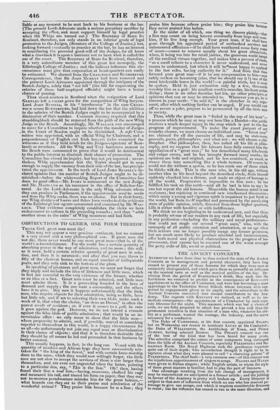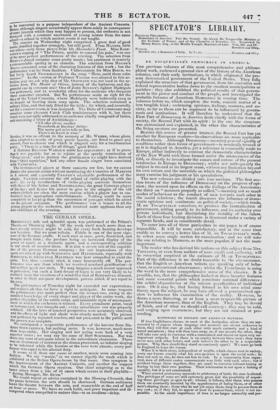TIIE ANCIENT CONCERTS.
At:moven we have from time to time noticed the state of the Ancient Concerts as to management and general character, they have long ceased to present any of those features for which they were once so eminently distinguished, and which gave them so powerful an influence on the musical taste as well as the musical polities of the day. De• dining from the period of BARTLEMAN'S death, they stink into the feebleness we ventured to predict as the consequence of KNYYETT'S appointment to the office of Conductor, and were fhst becoming a mere appendage to the Tenterden Street School, whose interests were supported by engagements given to its pupils, and the subscribers to the Ancient Concerts converted into annual contributors to the Academy. The rupture WWI KNYVETT we noticed, as well as its immediate consequence—the appointment of a Conductor by each separate Director for the night. This measure, which was but a choice of evils, we are fully prepared to admit has proved a less evil than the permanent retention in that situation of a man who, whatever his ability as a performer, wanted the courage, the industry, and the nerve necessary for a conductor.
The Duke of CAMBRIDGE, at his first concert, appointed SMART; but on Wednesday saw reason to nominate I.ueAs as his Conductor ; the Duke of WELLmarox, the Archbishop of YORK, and Prince Aunner, having selected Hist-tom The Prince's concert was one of the best of the kind that has been heard for many years. The selection comprised the names of some composers long estranged from the bills of the Ancient Concerts, especially PALESTRINA and SEBASTIAN BACH. His Royal Highness took the gentlemen reporters quite out of their depth; who nevertheless thought it right to be in raptures about what they were pleased to call " a charming quintet" of PALESTRINA. Tile chief fault—a very common one—of this concert was the injudicious apportionment of singers to songs. HANDEL and HAYDN were given to Italian singers; while English artists, to whom the style of these great masters is familiar, had to play the part of listeners. One advantage resulting from the late change of management it may be remembered we anticipated in a former article ; and the jobbing in favour of the Academy is pretty well broken up. Every Director is subject to that sort of influence from which no one who has musical patronage to give can escape, and which it requires considerable firmness to resist ; but the influence has ceased to run in the same direction, and
to be converted to a purpose independent of the Ancient Concerts. Bence, although singers occasionally appear there solely in consequence of some interest which they may happen to possess, the orchestra is not
hronged wills a constant succession of young misses from the same t
school—a school in which ancient music is not taught.
The concert on Wednesday night comprized a great deal of good music, jumbled together strangely, but still good. From HANDEL little was taken—only three pieces from his Alexander's Feast. Miss RAINFORTH'S singing of " The Prince, unable to conceal his pain," was one of the most perfect performances of the evening. The selection from bliana;s Joseph contains some pretty music; but prettiness is scarcely a commendable quality in an oratorio. T he selection from HArnst's Seasons presented some of the charming features of this work ; but the performance was Ihr from faultless. Unfortunately for Miss BIRCH, we bad lately heard STOCKHAUSEN in the song "Here, amid these calm recesses?' As the version of Professor TAYLOR was adopted in this selection, may we. ask why that of Mr. OLIPHANT was not used in the selection from The Mount of Olives, instead of the barbarous and die cad one in common use? One of JOHN BeNNET's lighter Madrigals was performed, and (a wonderful effort for the audience who frequent these concerts) encored. But Its performance made us sigh for the Says of the Vocal Concerts, where Madrigals were habitually sung as we despair of hearing them sung again. The selection contained a solitary Glee, and that only fitted for the table ; for which, and assuredly not for a concert-room, it was designed. The Duke of CAMBRIDGE may associate some pleasant Catch Club reminiscences with it, but these words were not aptly addressed to an audience chiefly composed of ladies, and containing a brace of Archbishops 1:11 offer all my sacrifice
llenceforth at Bacchus' shrine : The merry god neer tells us lies, There's no deceit in wine."
Besides, it was an affront to the memory of Mr. WEBBE, whose glees, often adapted to words of great poetic beauty, are fitted to grace any concert, thus to choose one which is adapted only for a bacchanalian party. " There is a time for all things," good Duke. A Madame BRANDIS WARLICH made her appearance; as if to prove that it was possible for us to rejoice at the speedy termination of "Porgi muor," and to destroy the gratification we might have derived from "Qua' sepolehro," had any other female singer been associated with TAMWRINI.
The instrnmental pieces at these concerts are few, but we cannot dismiss the present notice without mentioning the Concerto of MARTINI in A minor, and especially CRA3IER'S admirable performance of the adagio. CRAMER connects the old school of violin-playing with the new ; his early recollections of violin-playing associate themselves with those of his father and Baterum.smos, the great CORELLI player of his day ; and hence his power to give to the adagios of the old writers (which are often the mere canvas which a player has to embroider) their appropriate embellishments. Nothing could be more completely in keeping than the succession of passages which he added on the pment occasion. The performance was a lesson to all the young players in the orchestra, and received more applause than any solo exhibition of the evening.



























 Previous page
Previous page